News & Events in Belarus
Healthcare Ministry’s criticism, EAEU priorities, nuclear handshake in multifaceted President’s Week
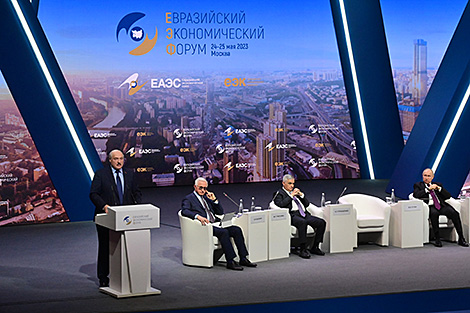
President of Belarus Alexandr Lukashenko took part in the plenary session of the II Eurasian Economic Forum in Moscow
The work schedule of the Belarus president is always full of events. Aleksandr Lukashenko holds conferences and working meetings on the most topical matters concerning the country’s development, regularly visits the regions, goes on foreign trips and welcomes foreign guests, talks to reporters, signs decrees and laws. And even if there are no public events, it does not mean that the head of state does not work. It must be said that even when he relaxes, for instance, by playing ice hockey or chopping firewood, Aleksandr Lukashenko happens to find the time to give yet another instruction. All the decisions must be prompted by life, he likes to say.
The President’s Week project is intended for those, who want to keep up with the head of state, be up-to-date on the latest statements and decisions of the Belarusian leader.
What ambitious task did Aleksandr Lukashenko formulate with regard to cooperation with Russia? About what is the president extremely displeased in Belarusian healthcare? Why did he promise to tear off a strip from those, who fail to set things straight before the new year? Why is it necessary to literally run in order to develop the Eurasian Economic Union? What does the Shanghai Cooperation Organization and BRICS have to do with it? How is Russia supposed to act as an engine? A mysterious handshake with Putin and arrangements concerning nuclear weapons, the top item on the agenda, a response to a “confused” Polish general, a reliable barrier against foreign infiltrators and many other things in the new episode of BelTA’s special project President’s Week.
FULL DISCLOSURE. What did the Belarusian ambassador to Russia report to Lukashenko?
On 22 May the head of state received Ambassador Extraordinary and Plenipotentiary of Belarus to Russia Dmitry Krutoi with a comprehensive report on bilateral cooperation. At the beginning of the meeting the president outlined a number of key matters for discussion. They are the state of trade and economic cooperation and its dynamics, development of interaction with Russian regions, the need to solve certain emerging issues, implementation of Union State programs and logistics involved in the export of domestic goods. They also talked about preparations for participation in the 2nd Eurasian Economic Forum, which was held in Moscow last week.
“Economy is the cornerstone of everything. As economists we know that there can be no relations without economy. I am aware of the statistics, I know that our trade has increased, and we have finally reached a trade surplus. In other words, trade is balanced. I am interested in dynamics, trends,” Aleksandr Lukashenko said.
Close attention is traditionally paid to direct cooperation with Russian regions. “We have always said that our success in Russia depends on its regions. I see that you travel a lot across Russian regions. And this is right. Governors come to us. We receive them at the highest level. How are the dynamics here? What is the attitude there, on the ground, to Belarus and Belarusian products? Generally speaking, what is the image of Belarus in this vast Russian space?” Aleksandr Lukashenko outlined another matter for discussion.
The head of state noted that he and Russian President Vladimir Putin meet a lot. “We do this not to look at each other, although this is also important, presidents’ attitudes are always important. In fact, we have tried to help governments, including you, to untie some knots,” the president said.
He wondered whether all the necessary decisions had been made on the part of Belarus, whether there were any questions for the presidents and governments to discuss during meetings.
Another block of questions dealt with the implementation of Union State programs in various fields. “We talk a lot about this. But I am more interested in specific programs like import substitution and so on. Remember, Russia was ready [to allocate] up to $1.5 billion. And I am sure that they are still ready to do it even if they have not provided the full amount by now.
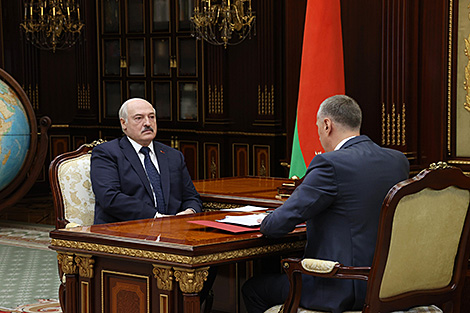
The president emphasized that neither Russia nor Belarus had been strangled by the West. Among other things the countries are working together to resolve logistics and transport issues. Belarus is especially interested in resolving the situation concerning cabotage transportation in Russia as soon as possible. All the issues are constantly monitored by Aleksandr Lukashenko.
Dmitry Krutoi shared some results of the meeting with journalists. An ambitious task has been set - to increase the volume of cooperation with the Urals, Siberia, and the Far East of Russia many times over. Despite the huge interest in cooperation mutual trade indicators are relatively low for now. “The president's suggested ‘we stop tossing things over the fence.’ It is clear that Smolensk, Bryansk, and Pskov are our immediate neighbors. But we have to go further. The attitude towards us there is as good," the ambassador noted.
For the president the number one topic is the protection of the market and the commodities, with which Belarus still has problems. A monitoring group constantly works on that and the situation concerning specific goods gets analyzed. On the whole, trade with Russia is growing and Belarus is even getting a trade surplus. But there are some commodity groups that need more effort. They include products of the domestic light industry, woodworking, and chemical industries.
MEDICINE FOR THE HEALTHCARE MINISTRY. What surprised the president most after an inspection of the healthcare system?
On 23 May Aleksandr Lukashenko hosted a government conference to discuss the most pressing healthcare issues. Top officials of the Healthcare Ministry, oblast governors and heads of the oblast departments in charge of healthcare, rectors of medical universities, chief doctors of hospitals of various levels, directors of some republican applied science centers took part in the event.
Aleksandr Lukashenko reminded that he had announced the plans for this meeting during his address to the nation and the parliament in order to thoroughly review the most acute problems of the national healthcare and take the necessary decisions. “That is why professionals, starting from practicing doctors to senior officials, not even the healthcare minister, have been invited to this hall to have this important discussion,” he said.
“As you know, healthcare does not only mean the treatment of patients. It is also a vital part of security of any state. It is even truer for our state. There will be no economy without a healthy nation. There will be no real sovereignty and independence without discipline and readiness to properly respond to modern challenges,” the Belarusian leader stressed.
The attitude to ordinary people is the main thing
According to Aleksandr Lukashenko, the national healthcare system proved its worth and was tempered well by the COVID-19 pandemic. It did more than well in comparison with other states. Once again the president thanked all the medics for their hard work.
On the whole, the Belarusian healthcare system has secured a number of accomplishments. For example, in the protection of motherhood and childhood, in transplantology, and so on.
The government is doing everything it can. Colossal amounts of money are spent on repair, equipment, salaries, and medications in healthcare industry. Of course, people have the right to see the return. “Today we will be talking about how we treat our people, our ordinary people, without whom we would not be in this hall. And more specifically: how do we treat people in rural areas, small towns, villages, and agro-towns? What is our attitude to them? We are not talking about republican applied science centers although they are also important, they are in the vanguard, they should set an example and teach others,” Aleksandr Lukashenko said to outline the main principal issue for discussion.
Recently however there has been a big amount of criticism regarding the quality of medical care and the absence of order in the healthcare institutions. These facts have been studied by an independent working group set up at the request of the head of state. Top officials of the State Control Committee and the Prosecutor General’s Office also presented their evaluations.
The president gave a lot of criticism and harsh warnings to top officials of the Healthcare Ministry and civil servants in the regions, including oblast governors. The government was also rebuked for giving pro forma responses to complaints about problems.
“I have perused these materials more than once and do you know what surprised me the most? The fact that there are still glaring problems in hospitals, polyclinics, rural health posts: walls and ceilings are falling apart, doors are askew, basic sanitary rules are not observed. Listen, any healthcare institution should be an example of sanitation. This happens even in pediatric departments that treat children! Are they not your children? Of course, they are not. But they are my children!" Aleksandr Lukashenko said.
There is a whole range of other issues regarding the operation and repair of expensive modern equipment, services available to the population in rural health posts and district hospitals, long waiting lists for examinations, staffing and quality of medical training, production and development of domestic medications. Aleksandr Lukashenko gave clear instructions and warned against conspiracy of silence.
“I will stop at nothing, and I will get this sector in order. Even if half of you are going to leave. But I will know who I am working with. You have got some nerve, running around executives starting with the district level and going up to the president, providing proper treatment only to them. What about ordinary people, who pay for all of it? Get down to earth! Everything in the country depends on us, who sit in this hall,” the head of state said. “The key indicator of effectiveness of your work is not the number of reports but the people you have helped keep their health and sometimes lives. There are no unimportant patients. Every patient is important.”
The head of state identified the accessibility and quality of medical care in rural areas as an acute problem. “I will never forgive you for the countryside. Never! Remember this. First and foremost, oblast governors. I'll skin you, but you will put things in order there!” the Belarusian leader stressed.
Pay all “debts” before the new year
Aleksandr Lukashenko summed up the conference by setting a specific deadline, by which all the identified shortcomings must be eliminated by all means.
Aleksandr Lukashenko said: “As a result, I need a document on my table one week from now. Either an executive order or a protocol of instructions. Get the minutes of the meeting, everything we’ve talked about. Everything must be written down. There is one deadline – 1 January 2024. All the shortcomings we’ve talked about must be fixed by 1 January. The president needs to sign a document that will be binding for everyone starting with the central government and ending with rural health posts.”
The fulfillment of all the instructions must be closely monitored, the head of state demanded. The State Control Committee and the Prosecutor General’s Office are responsible for it. “God forbid if I get a report that you’ve failed to carry out the smallest instruction. You will have only yourselves to blame. Progress must be secured everywhere,” Aleksandr Lukashenko said.
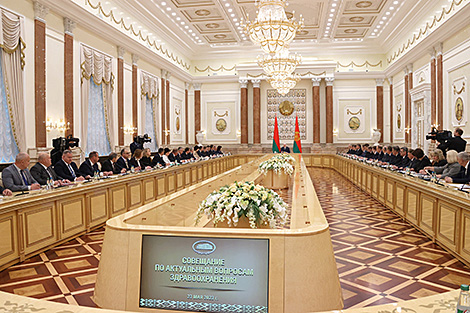
He gave instructions to keep the workgroup that had examined the situation in the healthcare system. By the end of the year the workgroup will have to once again examine all the institutions where faults had been found.
The head of state also drew attention to personnel training. He gave instructions to organize an audit of medical universities. “Take the closest look at them. It is necessary to shake up rectors and the management of higher education institutions. If they don’t get into shape, make proposals on replacing them. Everyone will go if necessary. It is intolerable, everything starts there,” Aleksandr Lukashenko remarked.
Some of the instructions concerned heads of oblast administrations: they will have to take care of the physical infrastructure of healthcare institutions.
“I’ve given instructions concerning all areas. God forbid if you fail to do something over there. Get involved and start working. Otherwise, guys, I will take pity on no one. If someone thinks that I am going to die, calm down. Calm down. This is nothing more than idle talk in instant messaging apps and Telegram channels. Adenovirus or what was it? Adenovirus. It’s nothing. Karanik smiles because it can be cured within three days. But since I had no time to spare for treatment (I had to go to Moscow, participate in a subbotnik, go to Grodno and then to Gomel), all of it piled up. This is why I am not going to die, guys. You will have to put up with me for a long time yet,” Aleksandr Lukashenko said.
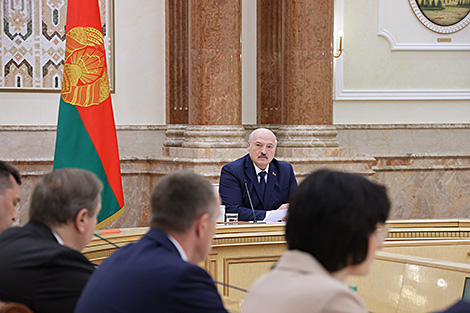
“If you couldn’t do it, I wouldn’t hold you accountable. But we can do it. There will be no self-complacency. We are creating our own country. We’ve accomplished a lot. Let’s polish it up so that we could leave it to the children. Get down to work,” the president added.
INTEGRATION, NOT CONFRONTATION. Why time and speed are essential for the EAEU now?
On 24 May Aleksandr Lukashenko arrived in Russia on a two-day working visit. The 2nd Eurasian Economic Forum began in Moscow on that day. It was traditionally timed to a regular session of the Supreme Eurasian Economic Council. The summit was held the next day and the Belarus president took part in it as well.
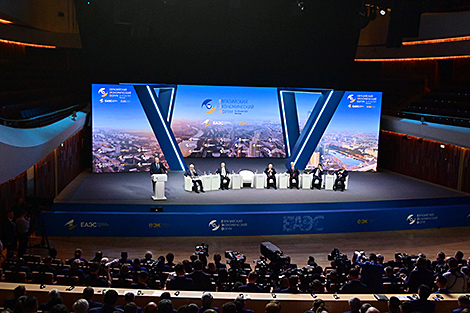
The motto of this year’s forum is “Eurasian integration in a multipolar world”. Attending the event were more than 2,700 representatives of government agencies, the business community, international organizations and mass media, including hundreds of foreign representatives from more than 50 countries.
In his speech the president presented Belarus’ stance and priorities on key matters of cooperation. Aleksandr Lukashenko’s speech was programmatic to a large degree not only on the regional scale but the global one as well. For instance, Aleksandr Lukashenko drew attention to the Eurasian Economic Union’s international positioning. He spoke about pooling integration efforts of the Eurasian Economic Union, the Shanghai Cooperation Organization, and BRICS. He underlined Russia’s role in the development of these processes.
The Belarus president touched upon such areas as industrial security and technological security, energy security and information security in the EAEU space. Aleksandr Lukashenko described food industry and efforts to ensure food security as the foundation that underpins everything. Matters of ecology and the realization of national strategies of sustainable development were also mentioned.
“We advance integration not for the sake of some confrontation. President Putin often talks about it. We would like to create multipolar equal and safe space for life activities. If we don’t do it, we will trail along at the back. And they will constantly wipe their feet off us. It is our common goal and we are ready to work hard to reach it as soon as possible.”
Aleksandr Lukashenko underlined that time is the most important thing today. “Time is slipping away. Slipping away fast. We must not lag behind and we shouldn’t fall behind. And our Eurasian Economic Union can play a major role in it because it has colossal perspectives. I’d say these perspectives are as great as those of the Shanghai Cooperation Organization or BRICS individually. This is why a lot needs to be done. We are moving in the right direction. Patience and time. And speed,” he said.
The birth of Eurasianism in Putin’s kitchen
Before the Belarusian head of state started his speech the moderator of the plenary session Aleksandr Shokhin remarked that Aleksandr Lukashenko is a patriarch of integration processes in the post-Soviet space as much as the first Kazakhstan president Nursultan Nazarbayev. The Belarus president had overseen many integration processes and had spoken in favor of preserving economic ties between countries.
Aleksandr Lukashenko said: “Sincerely speaking, as an experienced man I was present at the origins of many processes. I should tell you that our Eurasianism and the current Eurasian Economic Union originated as a kitchen table discussion at President Putin’s. It was truly like that. He is present here and can confirm it. And the concept was a good one then. Ukraine was with us back then – [a former Ukraine president] Leonid Danilovich Kuchma.”
“Although I told my colleague that it was unlikely something would come out of it because of the situation that had started evolving in the post-Soviet space and in our region back then. Nevertheless, together with Ukraine we worked out as many as 28 documents, I think. But later on Ukraine stepped away from this process as I’d anticipated,” Aleksandr Lukashenko remarked.
Aleksandr Lukashenko credited Nursultan Nazarbayev with keeping his colleagues within limits of an economic union despite attempts of the parties, particularly Russia, to add some political component or even a bit of a military political component to the union. “But since decisions have always been made via a consensus, we’ve arrived at where we are today,” the Belarusian head of state said.
Safety in numbers
“The world has been recently living in a constant state of tension and uncertainty. This is also natural in the period of transition from the old era to the new one, to which we aspire and which name is multipolarity. Financial, pandemic, geopolitical crises are replacing each other so quickly that people simply do not have time to take a breath and they lose confidence in the future,” the head of state noted in his speech during the session.
He stressed that a stable economy is always a powerful anchor amid extraordinary conditions. But today the economic borders of any state are so transparent and trade relations are so intertwined that it is practically an impossible task for any state to achieve economic stability on its own.
Therefore, any country is interested in joining powerful regional and international associations such as the EAEU, SCO, BRICS, and ASEAN.
Aleksandr Lukashenko spoke on a number of topical matters related to the integration agenda. Let us recount them briefly.
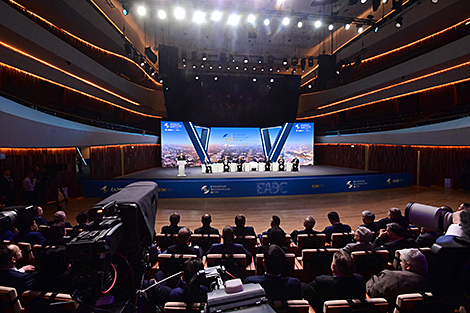
The international positioning of the Eurasian Economic Union
The center of the world economy is irreversibly shifting towards developing countries. Development will be secured primarily over there. Those are countries of Asia, Africa, Latin America, and the Middle East. These states no longer want to be sources of raw materials or cheap labor, the head of state noted.
“In our opinion, the aligning of integration efforts in the format of our Eurasian union, the SCO and BRICS will contribute towards the emergence of the largest coalition of states if we act promptly, if we don’t drop the ball as people say,” Aleksandr Lukashenko stated. “The current moment forces us to run instead of walking. Frankly speaking, we need to select those that match our standards faster.”
The president emphasized Russia’s role in these processes: “Russia should keep its spirits high in the current situation. It is Russia that can become a very strong locomotive both in the SCO and BRICS and give momentum to the development of these organizations. And perhaps to their unification in the future, something that the progressive humanity dreams of.”
“Russia should be very active. Its authority is enormous despite the fact that the West smears Russia in all mass media. Russia has dared challenge the unipolar world and is leading the charge. Well, we are there for them,” Aleksandr Lukashenko stressed.
Aleksandr Lukashenko stated that in order to develop full-scale relations of the EAEU with priority regional associations and friendly third countries, it is necessary to take several important steps towards each other: “We need to finally overcome national egoism, as we often say. We need to learn to compromise, reach agreements on gradual liberalization of mutual trade terms, remove barriers, switch to settlements in national currencies, and expand free trade zones.”
Industrial and technological security
Aleksandr Lukashenko urged the Eurasian Economic Union to build up its technological sovereignty regardless of how relations with the West change. According to the Belarusian leader, manufacturing cooperation will allow creating products under a Eurasian brand with the maximum rate of localization. It will also allow launching new import-substituting projects. Aleksandr Lukashenko said: “More than a quarter of the industrial goods the union imports to the tune of about $70 billion per year can be substituted with products made by national manufacturers. A huge chunk. I hope to god we can take it. The fourth industrial revolution will give a chance for effective realization of import-substituting initiatives in the real sector of the economy at the regional level.”
He also recounted the areas that Belarus will prioritize. Those are the development of manufacturing of high-precision equipment on the basis of modern microprocessors, electronic components and software, the realization of joint projects to make electronic and optic products, paying more attention to technologies for making microchips, integrated circuits, to technologies for driverless control, automation and robotization of processing industry.
Belarus’ priority development areas also include the production of electromechanical systems, including the development of technologies for making modern mechatronic and electromechanical components of robot technology systems, CNC equipment, and lithium-ion batteries.
Energy security
Aleksandr Lukashenko said: “The advancement and deepening of integration interaction in energy industry, the strengthening of positions of the Eurasian Economic Union in the context of global security remain an important priority. I am convinced that our economies cannot operate effectively unless commercial entities enjoy equal access to energy resources and the infrastructure for transporting these resources.”
Information security
In his speech Aleksandr Lukashenko mentioned the need to update the Eurasian Economic Union’s digital agenda: “The union’s digital agenda needs to be substantially updated. First of all, it applies to the integrated information system of the Eurasian Economic Union. It enables collaborative work of state information resources and systems of states of our union. We should be the ones to create it and control it without outsourcing it to Americans or Western Europeans like we did before. We have well-trained personnel and the physical infrastructure. People are ready to work in this direction.”
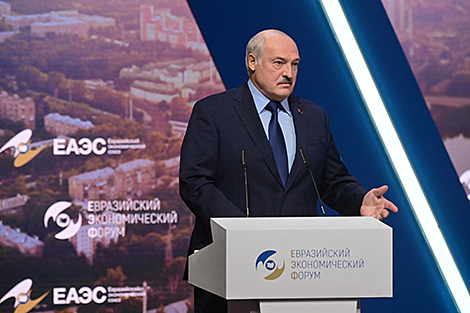
Food security
The head of state called food security the cornerstone. The Eurasian region has unique opportunities to increase food production and export. The demand for food is enormous and it keeps only growing. At the same time, a number of tasks need to be addressed in this area. It is necessary to compile a list of critical imports for the food market of the EAEU member states by means of using their own existing manufacturing facilities, their expansion and the creation of new ones.
Another task is to approximate the measures of state support for agriculture and the legal framework for its provision taking into account national interests of the participating countries. Aleksandr Lukashenko also called for fast digitalization of manufacturing processes in crop farming and livestock production.
Ecological security
The Belarusian head of state stated: “The so-called green agenda is actively used by the West as a tool to put pressure on our countries and restrain our economic development. The current emission standards Euro-5, 6 and all the consequent ones have nothing to do with environmental protection.”
Unlike the European Union the national strategies for sustainable (“green”) development adopted in the EAEU countries do not limit anyone. They imply, first of all, the modernization of economies, the creation of high-tech joint ventures, a thrifty attitude to resources, proper waste management, improving the environmental culture of people and responsibility of businesses. “We believe that we should forge ahead in this vein,” Aleksandr Lukashenko is convinced.
ONE FOR TWO. Why did Lukashenko and Putin shake hands during the Kazakhstan president’s speech?
Mass media reports took a close look at the speech Kazakhstan President Kassym-Jomart Tokayev made during the Eurasian Economic Forum, particularly at the part where he talked about the Union State of Belarus and Russia. The Kazakh leader either praised or reproached Belarus and Russia for the special and in many ways unique relations between the two countries within the EAEU’s “G5” in world political history.
“We have a union state in the EAEU. A unique precedent in world political history, or a phenomenon, whatever you want to call it: ‘two countries - one state’ with a single political, legal, military, economic, monetary, cultural and humanitarian space. With a single union state government, parliament. And they even share nuclear weapons now. There is another level of integration represented by Kazakhstan, Kyrgyzstan, and Armenia. We need to reckon with this reality. How we will work in these conditions is a conceptual question. We need to discuss this problem, including at this forum,” the Kazakhstan president said.
However, why this has suddenly become a problem is also not very clear. After all, the Eurasian Economic Union and even the Customs Union, which had preceded it, were being established while the Union State of Belarus and Russia was already in place and nobody was concerned about it. On the contrary, the advanced Belarusian-Russian experience may be in demand in the further development of the Eurasian Economic Union. Aleksandr Lukashenko mentioned it in his speech at the summit the next day.
But reporters were interested even more not in the Kazakhstan president’s words about Belarus and Russia sharing nuclear weapons but in the fact that Aleksandr Lukashenko and Vladimir Putin were talking about something, smiled, and shook hands at that moment.
Reporters asked the Belarus president to reveal the details on the sidelines of the session of the Supreme Eurasian Economic Council in the Kremlin on 25 May.
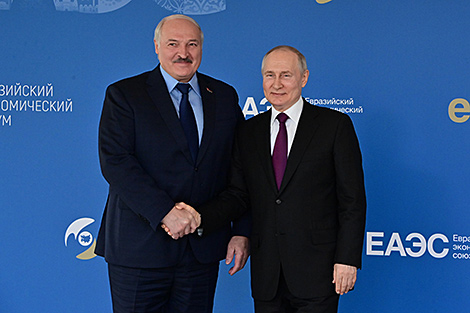
“When he was talking about nuclear weapons, honestly speaking, I didn’t catch it due to the acoustics in the hall. And Vladimir Vladimirovich [Putin] turned to me and said that a decision had been made to deploy tactical nuclear weapons in Belarus. That was what he told me. I thanked him. That was what we talked about. Not more than that,” Aleksandr Lukashenko shared the details.
The president answered the same question for another group of reporters later on. Aleksandr Lukashenko said: “He told me he had signed a decree on our actions concerning the deployment of nuclear weapons in Belarus. I mean a concrete document was discussed. A decision had been made in furtherance of a verbal discussion. We had to prepare storage facilities and the rest over there [in Belarus]. We’ve done all of that. This is why the relocation of nuclear munitions began.”
“Has it started already? Is [nuclear weaponry] already in Belarus?” a follow-up question was asked.
“Maybe. I will go and take a look,” Aleksandr Lukashenko said.
The head of state was also asked a question concerning efforts to ensure the security of nuclear weapons. “It is even out of the question. You know that we are punctual, accurate, and businesslike people as you say. This is why don’t you worry about nuclear weapons. We bear responsibility for it after all. It is a serious matter. Everything will be fine here, too,” Aleksandr Lukashenko assured.
DECISION-MAKING CENTER. What role should the Eurasian Economic Union play in the world?
On 25 May Aleksandr Lukashenko took part in a session of the Supreme Eurasian Economic Council in Moscow. The leaders of the countries discussed items on the agenda in a narrow-format meeting involving the five EAEU member states and then in an expanded-participation meeting involving leaders of the EAEU observer states and distinguished guests. Those included Azerbaijan President Ilham Aliyev, who took part in a session of the Supreme Eurasian Economic Council for the first time. Uzbekistan President Shavkat Mirziyoyev and Tajikistan President Emomali Rahmon joined the summit via videoconference. Cuban President Miguel Diaz-Canel Bermudez delivered a welcome speech through a video address.
Other invitees included CIS Secretary General Sergei Lebedev, SCO Secretary General Zhang Ming, and State Secretary of the Belarus-Russia Union State Dmitry Mezentsev.
The leaders of the countries signed a protocol to amend provisions of the Eurasian Economic Union Treaty with regard to the funding of joint manufacturing cooperation projects in branches of the manufacturing sector as well as a package of amendments to the EAEU Treaty - the so-called 3rd Big Protocol. A total of 15 documents were signed “This means that we are going beyond the basic treaty of 2014, exploring new cooperation opportunities and making the treaty more specific,” Chairman of the Board of the Eurasian Economic Commission Mikhail Myasnikovich told reporters after the summit.
At the session Aleksandr Lukashenko expressed opinion that the Eurasian Economic Union should become one of the world’s decision-making centers.
“Today’s world is on the brink of major changes, it is entering an era of large-scale transformations and strategic development. There is a growing awareness that the unipolar world order should be replaced with new decision-making centers that will take on board the interests of all participants in international relations. The attention to the events taking place in Moscow today clearly suggests that the Eurasian Economic Union should become one of such centers,” the Belarusian leader said.
The president made a number of statements concerning practical aspects of the development of cooperation in the union. The president called the decision to provide financial assistance to manufacturing cooperation projects a landmark document and expects it to have a serious effect.
Scope of work
“We are making obviously slow and difficult progress on some important issues of the internal agenda of Eurasian integration. First of all, this pertains to the development of common markets of gas, oil and petroleum products, the implementation of digital agenda and liberalization of the transport market,” the head of state said. “These are fundamental areas for our economies. Their relevance has only increased in the face of sanctions.”
No barriers, no restrictions!
Creating a genuine economic union remains a priority task for all of us, the Belarusian leader stressed.
The president said: “Everyone notes progress in this matter but I stick to my previous position: there must be no barriers or restrictions whatsoever! It is the underlying principle for building our union and we should reach the goal very soon.”
The president mentioned a great deal of work had been done to set up a common market of state and municipal purchases.
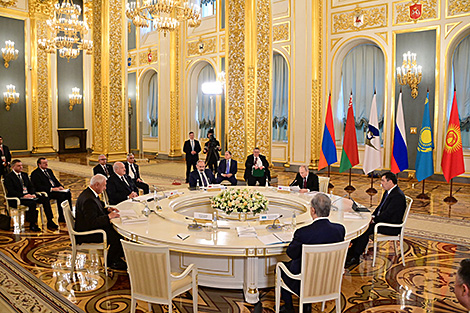
Joint response to sanctions
“Our response to the sanctions is stepping up cooperation with the SCO, BRICS and ASEAN, new trade agreements as well as constructive and mutually beneficial contacts with everyone who is ready to be our friends and partners,” the Belarusian leader stressed.
At the same time Aleksandr Lukashenko urged to maintain a balance of interests of all stakeholders.
To cut a window
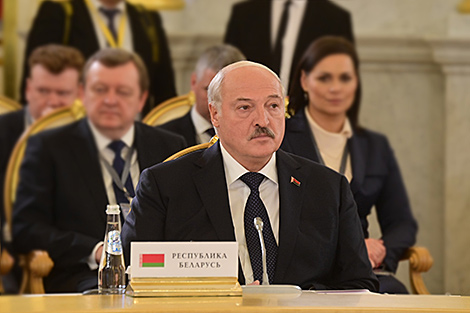
Aleksandr Lukashenko mentioned the improvement of transport infrastructure and the development of effective logistics as priority vectors of development of the Eurasian Economic Union. “Due to the turning of our export flows to the southeast, it is necessary to reach out to countries of this region through joint efforts. It is a bottomless market for our goods,” the Belarusian leader stressed.
Environment and politics
Aleksandr Lukashenko pointed out that the European Union has been actively preparing for trade in the current conditions for a number of years. The mechanism of cross-border carbon regulation being developed by the European Union will become a serious tool for influencing international trade. “The European Union will have an additional room for maneuver. Goods recognized as ‘clean’ will be allowed to access the market and those that are not in demand in their market will simply be blocked. They know how to do it,” Aleksandr Lukashenko said.
This is why the head of state believes it is necessary to unite efforts within the framework of the Eurasian Economic Union and develop their own approaches and measures to respond to climate challenges. “We need to move towards a structure of the economy, which is dominated by industries and technologies with low greenhouse gas emissions,” the Belarusian leader said.
From strategy to practice
“Belarus supports the need to identify approaches to working out a new strategy of Eurasian integration until 2030, or even 2045. The need was initiated as part of the Russian presidency,” the head of state said. “At the same time I would like to emphasize that while working out relevant strategic documents our Union may be interested in the experience of certain initiatives at the level of the Union State of Belarus and Russia that the president of Kazakhstan spoke so much about at the forum yesterday.”
He also cautioned against excessive enthusiasm for strategic planning: “At least, this useful work should not cancel or replace the practical activities to implement the goals and objectives of the EAEU Treaty.”
Aleksandr Lukashenko is convinced that through joint efforts the parties will be able to fully realize the potential of the Eurasian Economic Union both inside and outside the union. This will make it possible to create one of the full-fledged and responsible centers of a new multipolar world.
UPRISING AND THE LOCKED BORDER. What did Lukashenko tell reporters in the Kremlin?
Reporters traditionally pay close attention to the Belarus president. Representatives of mass media asked Aleksandr Lukashenko to answer a number of topical questions before and after the summit. Those relating to nuclear weapons have already been mentioned. But there were also many other questions.
“We’re ready. Let them come!”
The president commented on statements made in Poland about alleged preparations for an uprising in Belarus. “We are keeping an eye on the guys that this confused general talked about. They say they are putting together regiments or battalions. They call it that. But in fact... We know where they are. We know them by name. We’re ready. Let them come,” the head of state said.
“Unfortunately, they do not hear what I say. A few months ago I said that they were preparing an uprising, a revolution… I don’t know what they are preparing for in Belarus. But we have known for a long time that they are up to something, perhaps another revolt,” the president noted.
The biggest issue
One of the questions focused on Belarusian-Russian cooperation. The reporters asked Aleksandr Lukashenko to clarify what he meant when several days before the visit to Russia the president mentioned the need to discuss and resolve a number of problems. Aleksandr Lukashenko said: “You know, we have many issues, not problems that need to be addressed. The biggest issue is our common energy markets of natural gas, oil, and so on. I talked about it [during the summit]. It is the biggest issue that needs to be addressed. There are transport issues, logistics issues, and secondary issues. If we go below them, to petty issues, we will see some misunderstandings in the course of shipping our products to the Russian Federation, particularly agricultural goods and foods. This is this complex of issues.”
The reporter wondered whether Russia impedes import of Belarusian products. Aleksandr Lukashenko confirmed it: “Yes, we have problems concerning some goods. For instance, let’s talk about dairy products. We understand that there are periods of big milk yields. When Russia has plenty of milk, some braking process begins. It is wrong. I think we will resolve this issue at the government level. I don’t even discuss it with the Russian president. Because it is odd.”
Moreover, Aleksandr Lukashenko said that during the private part of the summit Vladimir Putin mentioned that Russia has a shortage of dairy products as large as about 15%. “But we cannot even plug this hole. Nevertheless, some like it,” the Belarusian leader noted.
When asked whether the sides had managed to come to terms on some specific problems, Aleksandr Lukashenko said: “I am talking about the entire Eurasian Economic Union after all. As for the Russian Federation, we can resolve any issue we raise today within several days.”
Infiltrators will not pass!
Reporters asked the head of state about possible provocations from the Polish territory and whether the border of Belarus and the Union State of Belarus and Russia is safely locked in this direction. “You don’t have to worry about that. Listen, if infiltrators have to penetrate your or our territory, there are many ways of doing it inconspicuously today. I mean, it can be done without crossing the actual no man’s land. I am saying it as a professional. This is why talks claiming that infiltrators can penetrate our territory if the border is not secure are unprofessional,” Aleksandr Lukashenko said.
“Infiltrators use other ways. None of the infiltrators we have apprehended in Belarus had to go across our border. Therefore there is no need to worry about border security,” he added.


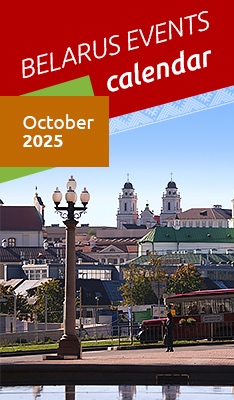




 print version
print version make home page
make home page add to bookmarks
add to bookmarks

